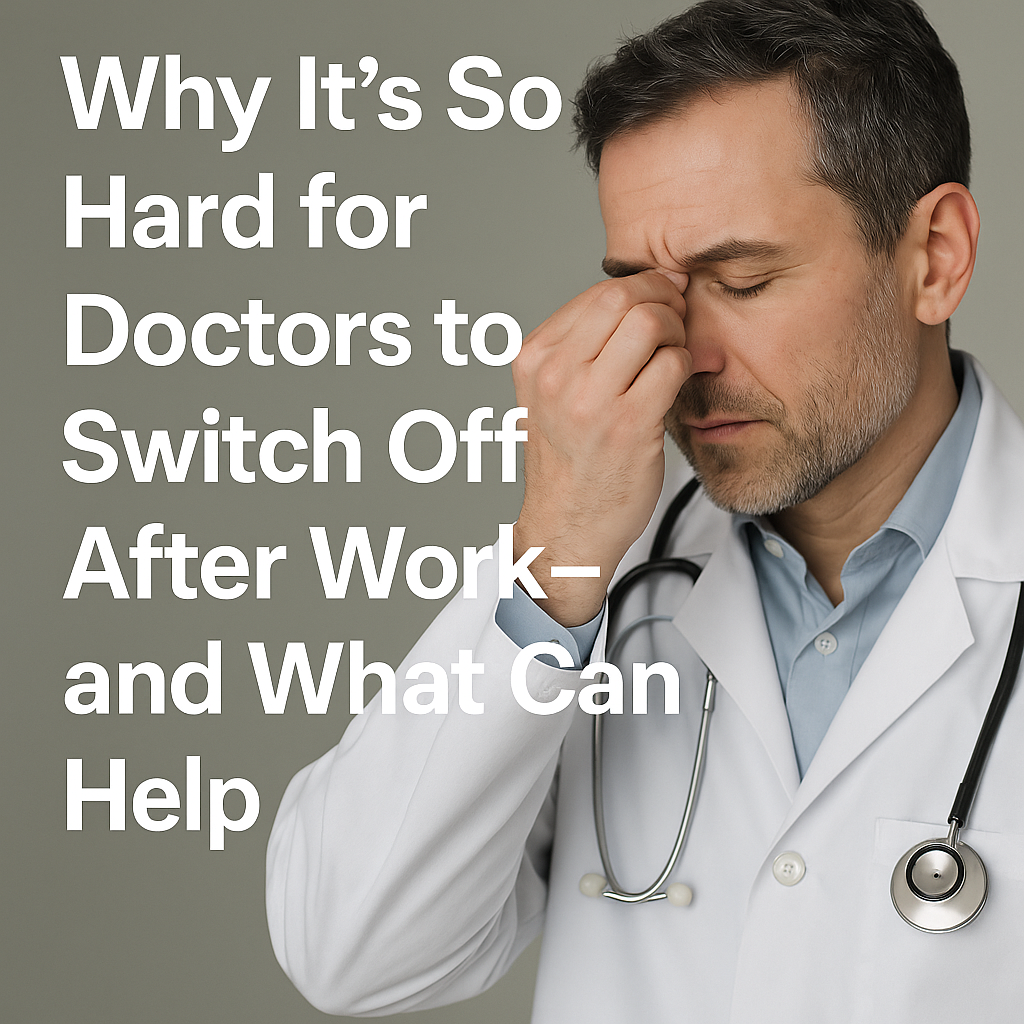Why It’s So Hard for Doctors to Switch Off After Work—and What Can Help
Being a doctor isn’t just a career—it’s an identity. It’s a calling filled with purpose, but also with pressure. While many professionals can leave their work behind at the end of the day, doctors often carry the weight of their responsibilities well beyond their hospital shifts.
Can doctors truly switch off after work? Or does the mental and emotional load of patient care always linger? This article explores why it’s difficult for doctors to disconnect, how it affects their well-being, and what strategies can help create a healthier balance—without compromising care.

1. Why Doctors Struggle to Switch Off
Medicine isn’t a 9-to-5 job—it’s a profession built on responsibility, trust, and high-stakes decisions. That makes “switching off” much more complicated than simply leaving the hospital.
1.1 Emotional Weight
Doctors witness suffering, make life-or-death decisions, and have difficult conversations every day. It’s no surprise that they carry their patients’ stories with them. Bad outcomes or near-misses often lead to guilt and overthinking, even long after the shift ends.
1.2 Work That Follows You Home
Long hours are just the beginning. Reviewing results, responding to messages, or finishing documentation at home has become the norm—especially with telemedicine and electronic medical records. The job doesn’t end when you walk out the hospital door.
1.3 Fear of Missing Something
Medical vigilance is a habit that’s hard to turn off. Many doctors run patient cases through their minds repeatedly, worried they might have missed something critical. This “residual attention” keeps their minds tethered to work—even during downtime.
1.4 A Culture That Never Rests
Medicine often glorifies overwork. There’s a quiet expectation that doctors should be always available, always responsible. Taking personal time can feel like a luxury—or even a betrayal of duty.
2. The Cost of Never Switching Off
Constant engagement with work takes a toll—not just on mental health, but on relationships, sleep, and even job performance.
2.1 Burnout and Exhaustion
Physician burnout is at an all-time high. Emotional exhaustion, depersonalization, and reduced sense of accomplishment are common, leading to increased medical errors and even physician suicide.
2.2 Strained Relationships
When your mind is still in the hospital, it’s hard to be fully present at home. Spouses, children, and friends may feel neglected, creating tension and emotional distance.
2.3 Health Consequences
The chronic stress of being “always on” contributes to insomnia, anxiety, hypertension, and even heart disease. Ironically, the healer’s health often suffers the most.
2.4 Cognitive Fatigue
Mental fatigue reduces decision-making speed and accuracy. The overworked mind becomes slower and more error-prone—making doctors less effective, not more.
3. Can Doctors Learn to Disconnect?
While it may be unrealistic to completely switch off, doctors can learn to manage the mental load more effectively.
3.1 Set Clear Boundaries
Turn off work notifications outside of shifts. Set limits for checking emails or patient records. Respect your own time off—and encourage others to do the same.
3.2 Create Post-Work Rituals
Help your brain shift gears after work. Take a walk, listen to music, or practice deep breathing. Changing clothes or journaling at the end of the day can also help signal a mental transition.
3.3 Focus on Presence-Driven Activities
Exercise, creative hobbies, time with family or pets—all require focus and can draw attention away from work thoughts. These activities also recharge emotional energy.
3.4 Learn to Say No
Overcommitment leads to overload. Delegate when possible, and don’t hesitate to say no to extra shifts or meetings that compromise your recovery time.
3.5 Seek Support
Talking to a therapist, mentor, or peer can help process difficult emotions and reduce the mental weight of unresolved patient stories.
3.6 Prioritize Sleep and Recovery
A consistent sleep routine strengthens cognitive function and emotional resilience. Avoid screens and medical tasks before bed, and use calming techniques to wind down.
4. A Balanced Reality: It’s Okay Not to Switch Off Completely
For most doctors, completely disconnecting from medicine may never happen—and that’s okay. Caring deeply is part of the profession.
But it is possible to carry that responsibility in a healthier way.
By setting boundaries, practicing self-care, and allowing space for life outside medicine, doctors can protect their well-being, strengthen their relationships, and become more sustainable in their roles.
The goal isn’t to stop caring—it’s to care in a way that allows you to thrive, not just survive.
